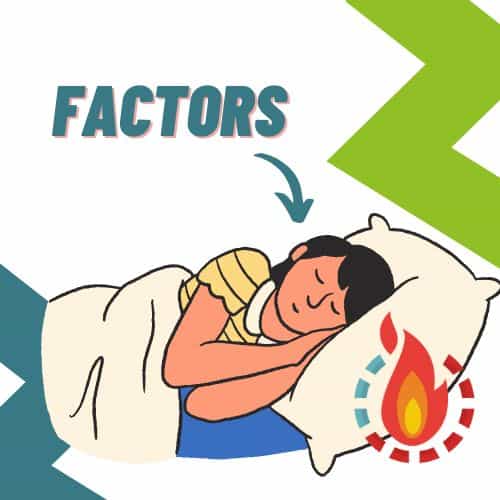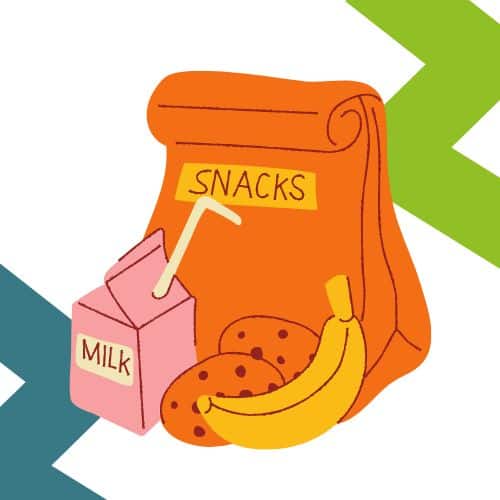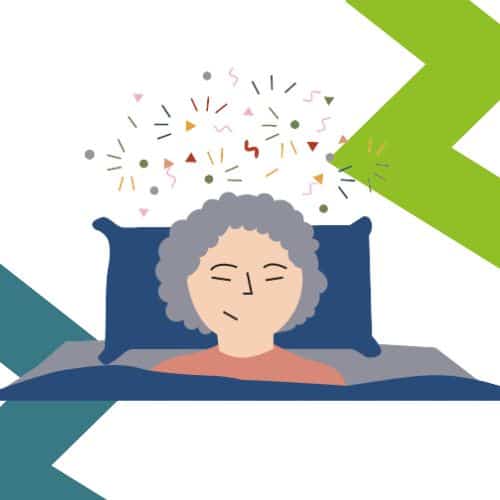If you’re looking for ways to burn more calories, think about what you do at night. Studies show that about 20% of your resting metabolic rate, or the calories you burn when you’re not moving, comes from mental activity.
That is because while you sleep, your brain remains awake and keeps performing its function. In fact, during sleep, your brain works just as hard as when you’re awake.
So, how many calories do you use up while you sleep? It turns out that there are many things going on. In this post, we explain everything about how many calories you’re burning during sleep.
Figuring Out How Many Calories You’re Burning
A 125-pound person burns about 38 calories per hour while they sleep. That does not seem like much. When multiplied by the 7 to 9 hours of sleep recommended by experts each night, this equates to 266 to 342 calories that could be burnt while sleeping.
The number of calories burned increases as body mass increases. Therefore, a 150-pound individual could perhaps burn forty-six calories every hour, or “322” to “414” calories in one night. Similarly, an individual weighing 185 pounds may burn approximately “392” and “504” calories, or around 56 calories, during a full night of sleep.
How exactly are these numbers calculated? It all depends on how your body works. Metabolism is the process by which food is turned into energy that the body can use for daily tasks. Even things like breathing and circulation cost your body calories.
On the other hand, your basal metabolic rate (BMR), is the number of calories you burn each day when you’re not doing anything. This includes activities like sleeping and sitting.
So, to figure out your BMR, you use an equation that takes into account your weight, height, and age. For height, you use inches and for weight, you use pounds.
“BMR for men is 66 + (6.2 x weight) + (12.7 x height) – (6.76 x age).
655.1 + (4.35 x weight) + (4.7 x height) – (4.7 x age) = women’s basal metabolic rate (BMR)
For instance: A 35-year-old man who is 5 feet 11 inches tall and weighs 175 pounds would be: 66 + (6.2 x 175) + (12.7 x 71) – (6.76 x 35) = 1,816 calories”.
A 35-year-old woman who is 5 inches tall and weighs 135 pounds would burn Calories: “655.1 + (4.35 x 135) + (4.7 x 65) – (4.7 x 35) = 1,383 calories”.
Additionally, when you rest, sleep and do other things, you’ll burn more calories if your body has more mass. Because men tend to have more muscle mass than women of the same weight, men tend to burn more calories at rest[2].
Factors That Impact Sleep Burn?

Even if you are a literal boss all night, running in your dreams will not cause you to burn more calories during sleep.
If you wish to increase your BMR, you can increase your metabolism through healthy nutrition and exercise. This will also lead your body to burn more calories constantly, whether you’re daydreaming or jogging around the neighborhood.
Here are some additional factors that can alter your metabolism and sleep burn.
1. Late-night snacks

There’s nothing better than pizza at midnight, right? You may have heard that eating before night will decrease your metabolism, however, this is not supported by scientific evidence.
In fact, midnight cravings might temporarily increase your metabolism through a process known as thermogenesis. It is a process that dissipates energy as heat after you eat[4].
Concern yourself less with when you eat and more with what you eat. Snacking frequently during the day can result in weight gain and a slowed metabolism.
2. Muscle gains

The greater your muscle mass, the more calories you will burn. Therefore, incorporating everyday exercise, particularly strength training, can cause you to burn more calories when sleeping (and while hitting snooze… 10 times)[5].
3. Beware of supplements that raise your metabolic rate

Let’s face it: weight loss supplements and anything else claiming to increase your metabolism might be shady as hell.
They are certainly not all awful, but many involve dangerous substances and questionable claims. To reduce weight, you may wish to try a natural appetite suppressor and keep to your regular exercise and nutritious diet. However, consult with your doctor before taking any supplement.
4. Drinking Coffee After Coffee

Study indicates that caffeine provides a short mini-boost to your metabolism that may last into your sleeping hours[6].
But hold off on the Red Bulls and cappuccinos for now. There has not been enough research conducted to confirm that caffeine has a long-term effect on weight loss.
Also, Read 12 Amazing Drinks That Boost Weight Loss & Burns Fat While Sleeping!
5. Not Enough Sleep

If you cannot sleep Whether due to work strain, sleeplessness, or late-night Netflix marathons, a study indicates poor rest can lead to an increase in cortisol levels [7].
Cortisol causes the body to retain excess fat, increases hunger (and irritability), and slows the metabolism. In addition, according to a 2017 study, longer sleep duration is related to a lower BMI and improved metabolic profiles [8].
6. Certain Health Problems

Certain disorders, such as Cushing syndrome, and hypothyroidism can reduce the metabolism. In these conditions, even with a good diet and regular exercise, one can lead to weight gain and a slower calorie burn.
So, consult your physician if you suspect you have a problem that affects your metabolism. They can
Frequently Asked Questions (FAQs)
How Many Calories Do You Burn When Sleeping?
An individual burns between 68 and 91 calories each hour, or between 544 and 728 calories for eight hours of sleep. Additionally, the number of calories you burn when sleeping is heavily influenced by your weight. A person of 150 pounds (68 kg) burns sixty-eight calories in one hour while sleeping, so he/she will burn approximately 544 in 8 hours. Similarly, a person weighing 200 pounds (98.1 kg) burns ninety-one calories in a single hour (728 in 8 hours).
How Many Hours Of Sleep Should I Get For Weight Loss?
To reduce weight, you do not need to sleep more or less than suggested. When planning your sleep pattern, you should consider the Centre of disease control recommendations for your age group and consider the appropriate number of hours of sleep. Every night, adults should receive between 7 and 9 hours of sleep.
Can Excessive Sleep Lead To Weight Gain?
Both insufficient and excessive sleep can affect your metabolism and lead to weight gain. You should receive the required number of hours of sleep to maintain optimal internal functions. A healthy physique allows you to maintain a healthy weight while oversleeping might contribute to weight gain because you are likely to spend fewer hours upright and active every day.
How Many Calories Are Burned During An Eight-Hour Sleep?
Per hour of sleep, the average person will burn between 50 and 80 calories. How many calories are burned during sleeping is a question often asked. The answer varies on your size, age, gender, and the total amount of time spent sleeping. A male weighing 180 pounds and 20 years old will burn 620 calories over 8 hours of sleep.
Why Do Calories Get Burned When You Sleep
Your body consumes energy, constantly. Even when you stay asleep, your heart beats, your hair and fingernails grow, and your mind remains active in dreams.
So, while you sleep, your body continues to function and burn calories. Just not as many as you encounter on a daily basis.
How Many Calories Do You Burn On A Daily Basis?
Without exercise, the majority of individuals will burn over 1800 calories per day. This is due to the fact that we burn the majority of our calories through normal body functions. Even at rest, our bodies must maintain a wide variety of housekeeping operations.
assess you using technologies such as blood testing to diagnose certain illnesses.
Improve Your Sleep to Burn More Calories
According to our calculations, people burn between 300 and 700 calories each night. To increase this number, try sleeping in a 68-degree room that is cold and dark. This will assist you in burning more calories in order to maintain your body temperature.
Regular exercise during the day can also improve nighttime sleep. REM sleep is when you burn the most calories, so make sure your sleep cycle gets you there.
Insomnia, on the other hand, can lead to weight gain and may contribute to numerous health problems, including heart disease and even cancer. If you’re having trouble getting eight hours of sleep each night, try maintaining a consistent sleep pattern and minimizing your usage of electronics and television before bed. If this does not work, visit your doctor to determine if you have a sleep condition.
References
- Raichle ME, Gusnard DA. Appraising the brain’s energy budget. Proc Natl Acad Sci U S A. 2002 Aug 6;99(16):10237-9. doi: 10.1073/pnas.172399499. Epub 2002 Jul 29. PMID: 12149485; PMCID: PMC124895.
- Buchholz AC, Rafii M, Pencharz PB. Is the resting metabolic rate different between men and women? Br J Nutr. 2001 Dec;86(6):641-6. doi: 10.1079/bjn2001471. PMID: 11749674.
- Beasley, E. (2018). Calories. In Misperceptions of the Social World (pp. 101-106). Routledge.
- https://www.eatright.org/health/wellness/your-overall-health/metabolism-myths-and-facts?rdType=site_move&rdInfo=yoh6
- da Mota, G. R., Orsatti, F. L., da Costa, T. N. F., & Júnior, M. M. (2010). Strength training and weight loss. Journal of the Health Sciences Institute, 28(4), 337-340.
- https://www.healthline.com/health/caffeine-effects-on-body
- Herhaus, B., Ullmann, E., Chrousos, G., & Petrowski, K. (2020). High/low cortisol reactivity and food intake in people with obesity and healthy weight. Translational psychiatry, 10(1), 1-8.
- Potter, G. D., Cade, J. E., & Hardie, L. J. (2017). Longer sleep is associated with lower BMI and favorable metabolic profiles in UK adults: Findings from the National Diet and Nutrition Survey. PloS one, 12(7), e0182195.
Related Articles:
- How to Burn Fat While Sleeping
- How to Lose Weight While Sleeping
- How to Stop Snoring While Sleeping
- How to Relieve Hip Pain While Sleeping
- How to Prevent Dry Mouth While Sleeping
- What Causes Leg Cramps While Sleeping
- How to Decompress Spine While Sleeping
- How to Clear a Stuffy Nose While Sleeping
- How to Increase Oxygen Levels While Sleeping
- How to Relieve Lower Back Pain While Sleeping
- What Should Your Heart Rate be While Sleeping
- What Causes Headaches at Night While Sleeping
- What Causes Extremely Dry Mouth While Sleeping
- How to Improve Circulation in Legs While Sleeping
- How to Relieve Back Pain During Pregnancy While Sleeping
